Related Research Articles
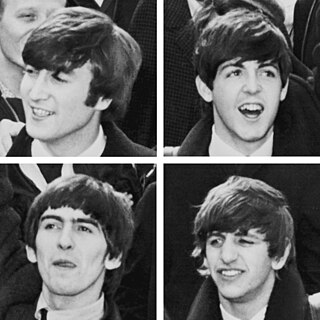
The Beatles were an English rock band formed in Liverpool in 1960, comprising John Lennon, Paul McCartney, George Harrison and Ringo Starr. They are regarded as the most influential band of all time and were integral to the development of 1960s counterculture and the recognition of popular music as an art form. Rooted in skiffle, beat, and 1950s rock 'n' roll, their sound incorporated elements of classical music and traditional pop in innovative ways. The band also explored music styles ranging from folk and Indian music to psychedelia and hard rock. As pioneers in recording, songwriting and artistic presentation, the Beatles revolutionised many aspects of the music industry and were often publicised as leaders of the era's youth and sociocultural movements.

Help! is the fifth studio album by the English rock band the Beatles and the soundtrack to their film of the same name. It was released on 6 August 1965. Seven of the fourteen songs, including the singles "Help!" and "Ticket to Ride", appeared in the film and take up the first side of the vinyl album. The second side includes "Yesterday", the most-covered song ever written. The album was met with favourable critical reviews and topped the Australian, German, UK and US charts.
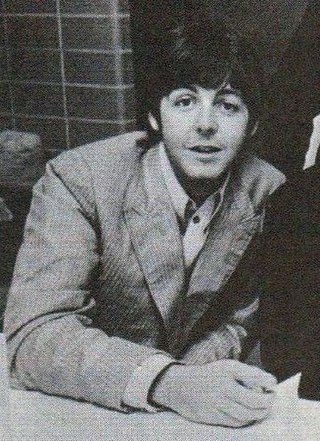
"Paul is dead" is an urban legend and conspiracy theory alleging that English musician Paul McCartney of the Beatles died in 1966 and was secretly replaced by a look-alike. The rumour began circulating in 1966, gaining broad popularity in September 1969 following reports on American college campuses.

"Get Back" is a song recorded by the British rock band the Beatles and Billy Preston, and written by Paul McCartney though credited to the Lennon–McCartney partnership. It was originally released as a single on 11 April 1969 and credited to "The Beatles with Billy Preston". The song is one of the few examples of John Lennon featuring prominently as lead guitarist. The album version of this song contains a different mix that features a studio chat between Paul McCartney and John Lennon at the beginning which lasts for 20 seconds before the song begins, also omitting the coda featured in the single version, and with a final dialog taken from the Beatles' rooftop concert. This version became the closing track of Let It Be (1970), which was released just after the group split up. The single version was later issued on the compilation albums 1967–1970, 20 Greatest Hits, Past Masters, and 1.

"Strawberry Fields Forever" is a song by the English rock band the Beatles, written by John Lennon and credited to Lennon–McCartney. It was released on 13 February 1967 as a double A-side single with "Penny Lane". It represented a departure from the group's previous singles and a novel listening experience for the contemporary pop audience. While the song initially divided and confused music critics and the group's fans, it proved highly influential on the emerging psychedelic genre. Its accompanying promotional film is similarly recognised as a pioneering work in the medium of music video.

"The Long and Winding Road" is a song by the English rock band the Beatles from their 1970 album Let It Be. It was written by Paul McCartney and credited to Lennon–McCartney. When issued as a single in May 1970, a month after the Beatles' break-up, it became the group's 20th and last number-one hit on the Billboard Hot 100 chart in the United States.

"Let It Be" is a song by the English rock band the Beatles, released on 6 March 1970 as a single, and as the title track of their album Let It Be. It was written and sung by Paul McCartney, and credited to the Lennon–McCartney partnership. The single version of the song, produced by George Martin, features a softer guitar solo and the orchestral section mixed low, compared with the album version, produced by Phil Spector, featuring a more aggressive guitar solo and the orchestral sections mixed higher.

"Hello, Goodbye" is a song by the English rock band the Beatles, written by Paul McCartney and credited to Lennon–McCartney. Backed by John Lennon's "I Am the Walrus", it was issued as a non-album single in November 1967, the group's first release since the death of their manager, Brian Epstein. The single was commercially successful around the world, topping charts in the United States, the United Kingdom, France, West Germany, Canada, Australia and several other countries.

"Ticket to Ride" is a song by the English rock band the Beatles, written primarily by John Lennon and credited to Lennon–McCartney. Issued as a single in April 1965, it became the Beatles' seventh consecutive number 1 hit in the United Kingdom and their third consecutive number 1 hit in the United States, and similarly topped national charts in Canada, Australia and Ireland. The song was included on their 1965 album Help! Recorded at EMI Studios in London in February that year, the track marked a progression in the Beatles' work through the incorporation of drone and harder-sounding instrumentation relative to their previous releases. Among music critics, Ian MacDonald describes the song as "psychologically deeper than anything the Beatles had recorded before" and "extraordinary for its time".
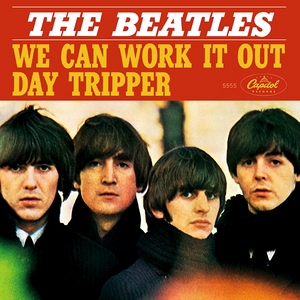
"We Can Work It Out" is a song by the English rock band the Beatles, written by Paul McCartney and John Lennon. It was first issued as a double A-side single with "Day Tripper" in December 1965. The song was recorded during the sessions for the band's Rubber Soul album. The single reached number one in Britain, the United States, Australia, Canada and Ireland. In the UK, it was the seventh highest selling single of the 1960s.

"And Your Bird Can Sing" is a song by the English rock band the Beatles. It was released on their 1966 album Revolver, apart from in the United States and Canada, where it instead appeared on Yesterday and Today. The song was written mainly by John Lennon and credited to Lennon–McCartney. The recording features an extended dual-guitar melody, played by George Harrison and Paul McCartney, which anticipated the harmonised guitar arrangements commonly used by Southern rock, hard rock and heavy metal bands.
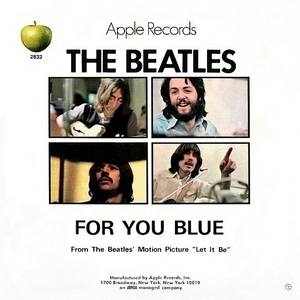
"For You Blue" is a song by the English rock band the Beatles from their 1970 album Let It Be. The track was written by George Harrison as a love song to his wife, Pattie Boyd. It was also the B-side to the "Long and Winding Road" single, issued in many countries, but not Britain, and was listed with that song when the single topped the US Billboard Hot 100 and Canada's national chart in June 1970. On the Cash Box Top 100 chart, which measured the US performance of single sides individually, "For You Blue" peaked at number 71.
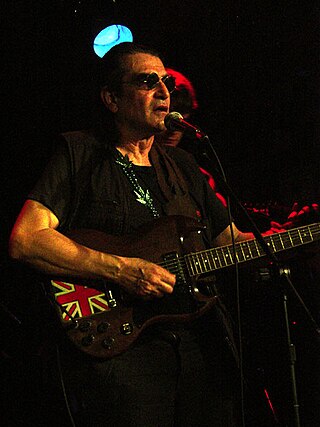
David Peel was a New York City–based musician who first recorded in the late 1960s with Harold Black, Billy Joe White, George Cori and Larry Adam performing as David Peel and The Lower East Side Band. His raw, acoustic "street rock" with lyrics about marijuana and "bad cops" appealed mostly to hippies and the disenfranchised.

"Ob-La-Di, Ob-La-Da" is a song by the English rock band the Beatles from their 1968 double album The Beatles. It was written by Paul McCartney and credited to the Lennon–McCartney partnership. Following the album's release, the song was issued as a single in many countries, although not in the United Kingdom or the United States, and topped singles charts in Australia, Japan, New Zealand, Switzerland and West Germany. When belatedly issued as a single in the United States in 1976, it peaked at number 49 on the Billboard Hot 100.

"The Ballad of John and Yoko" is a song by the English rock band The Beatles that was released as a non-album single in May 1969. It was written by John Lennon and credited to the Lennon–McCartney partnership, and chronicles the events surrounding the wedding of Lennon and Yoko Ono. The song was the Beatles' 17th UK number-one single and their last for 54 years until "Now and Then" in 2023. In the United States, it was banned by some radio stations due to the lyrics' reference to Christ and crucifixion. The single peaked at number 8 on the US Billboard Hot 100. The song has subsequently appeared on compilation albums such as Hey Jude, 1967–1970, Past Masters, and 1.

"I Feel Fine" is a song by the English rock band the Beatles that was released in November 1964 as the A-side of their eighth single. It was written by John Lennon and credited to the Lennon–McCartney partnership. The recording includes one of the earliest uses of guitar feedback in popular music.

"Help!" is a song by the English rock band the Beatles that served as the title song for the 1965 film and its soundtrack. It was released as a single in July 1965, and was number one for three weeks in the United States and the United Kingdom.

On the evening of 8 December 1980, English musician John Lennon, formerly of the Beatles, was shot and fatally wounded in the archway of the Dakota, his residence in New York City. The killer, Mark David Chapman, was an American Beatles fan who was jealous and enraged by Lennon's rich lifestyle, alongside his 1966 comment that the Beatles were "more popular than Jesus". Chapman said he was inspired by the fictional character Holden Caulfield from J. D. Salinger's novel The Catcher in the Rye, a "phony-killer" who loathes hypocrisy.
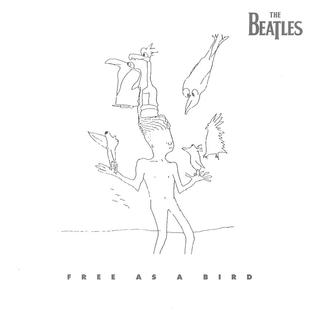
"Free as a Bird" is a single released in December 1995 by English rock band the Beatles. The song was originally written and recorded in 1977 as a home demo by John Lennon. In 1995, 25 years after their break-up and 15 years after Lennon's murder, his then surviving bandmates Paul McCartney, George Harrison and Ringo Starr released a studio version incorporating the demo.

All This and World War II is a 1976 musical documentary directed by Susan Winslow. It juxtaposes Beatles songs covered by a variety of musicians with World War II newsreel footage and 20th Century Fox films. The film was rejected by critics and ran only two weeks in cinemas.
References
- ↑ Marinucci, Steve (7 October 2016). "Filmmakers say 'The Lennon Report' Will Set Record Straight on ex-Beatle's Death". Billboard. Billboard. Retrieved 8 October 2016.
- ↑ Marinucci, Steve (7 October 2016). "Filmmakers say 'The Lennon Report' Will Set Record Straight on ex-Beatle's Death". Billboard.